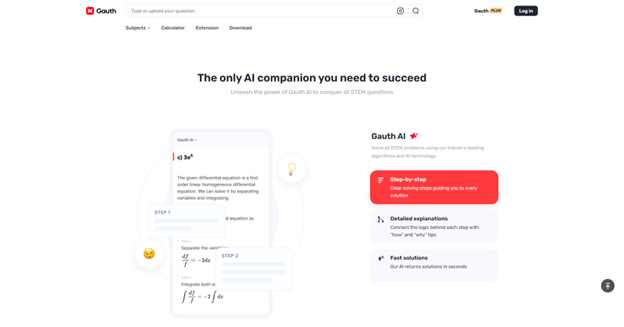The pursuit of quality education for all students faces a persistent challenge: learning gaps. These gaps, often exacerbated by disparities in resources, support systems, and learning environments, represent a significant obstacle to achieving educational equity and unlocking the full potential of every student. But what if technology could play a vital role in bridging these divides?
AI homework assistants like Gauth, with their capacity for personalized learning experiences and on-demand support, are emerging as powerful tools for addressing learning gaps and fostering a more inclusive educational landscape.
The Persistence of Learning Gaps: Unraveling the Complexities
Learning gaps manifest as disparities in academic performance and understanding among students, often stemming from a confluence of factors, including:
- Socioeconomic Disparities: Students from disadvantaged backgrounds may lack access to essential resources like quality schools, technology, and enriching learning environments, putting them at a disadvantage from an early age.
- Varied Learning Styles and Paces: Traditional classroom settings often struggle to cater to the diverse learning styles and paces of individual students. Some students may thrive in a lecture-based format, while others may require more hands-on or visual approaches to grasp concepts effectively.
- Limited Access to Personalized Support: Not every student has access to private tutors or robust support systems outside the classroom. This lack of individualized attention can hinder their ability to overcome learning obstacles and reach their full academic potential.
- The “Summer Slide”: Extended breaks from school, such as summer vacation, can lead to learning loss, particularly for students from disadvantaged backgrounds who may have limited access to educational resources during these periods.
AI Homework Assistance: A Tailored Approach to Bridging the Divide
AI-powered homework assistance platforms offer a compelling solution to address learning gaps by providing:
- Personalized Learning Experiences: AI algorithms can analyze a student’s strengths and weaknesses, tailoring learning content and pacing to their individual needs. This personalized approach helps ensure that students are appropriately challenged and supported at their respective learning levels.
- On-Demand Support and Instant Feedback: Gone are the days of waiting for a teacher’s feedback or struggling through a problem alone. AI homework assistance provides instant support and feedback, enabling students to course-correct and solidify their understanding in real-time.
- Increased Engagement and Motivation: By making learning more interactive, engaging, and individualized, AI homework assistance platforms can enhance student motivation and create a more positive learning experience.
- Accessibility and Affordability: Unlike traditional tutoring services, many AI-based platforms are readily accessible online and often more affordable, making them a viable option for a wider range of students.
Realizing the Potential: Implementation and Ethical Considerations
While AI homework assistance holds immense promise, its success hinges on thoughtful implementation and a focus on ethical considerations:
- Ensuring Equitable Access: Efforts must be made to bridge the digital divide and ensure that all students have equal access to technology and internet connectivity, regardless of their socioeconomic backgrounds.
- Fostering Human-AI Collaboration: AI should complement and enhance, not replace, the role of educators. Teachers remain crucial for providing guidance, fostering critical thinking skills, and addressing the social-emotional needs of students.
- Addressing Bias and Promoting Fairness: As with any AI technology, it is critical to address potential biases in data sets and algorithms to ensure that AI homework assistance platforms are equitable and do not perpetuate existing disparities.
- Prioritizing Data Privacy and Security: Protecting student data is paramount. AI platforms must adhere to strict privacy standards and ensure the responsible use of student information.
The Transformative Power of AI in Education
AI homework assistance has the potential to be a game-changer in education, empowering students to take ownership of their learning and bridging long-standing learning gaps. By providing personalized support, instant feedback, and a more engaging learning experience, AI can help create a more inclusive and equitable educational landscape where every student has the opportunity to succeed.
Furthermore, the use of AI in education can free up educators’ time, allowing them to focus on other important aspects of teaching, such as mentorship, creative lesson planning, and addressing the individualized needs of students who may require additional support beyond what AI can provide. This human-AI collaboration is key to maximizing the benefits of these advancements in education. It’s important to note that while AI can address specific learning challenges, it cannot replicate the essential role of a teacher in fostering a supportive and inspiring learning environment.
Platforms like www.gauthmath.com are at the forefront of this educational revolution, leveraging the power of AI to make quality learning support accessible to all.
As we navigate the evolving landscape of education, embracing the potential of AI, while remaining mindful of its ethical implications, will be paramount. By fostering collaboration between educators, technologists, policymakers, and families, we can harness the transformative power of AI to unlock a brighter future for all learners.


